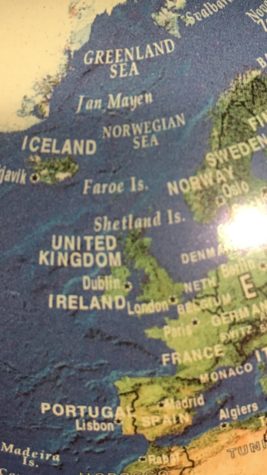As Brexit Deadline Looms, UK’s Future Hangs in the Balance
Everything you need to know about the UK’s plan to leave the European Union
Online articles like this attempt to educate the public about all of Brexit’s options to help them prepare for the future
With the deadline for Great Brittain’s Brexit implementation looming, what do you think the future will bring? Relative normalcy or the collapse of the United Kingdom and Europe’s economy with it? This is the question that anyone following Brexit, the United Kingdom’s plan to leave the European Union, is asking themselves.

The United Kingdom consists of England, Northern Ireland, Scotland, and Wales.
Ever since 1975, when the United Kingdom issued its first referendum asking citizens whether or not they believe the UK should remain a part of the then-called European Committees, there have been talks of independence for the United Kingdom. With the deadline of March 29th looming ever closer and the word appearing frequently on the news, now is a great time to grab a drink, take a seat, and review exactly what Brexit is and how it came to be. Following a 2015 renewal of desire to leave the EU, the United Kingdom has ever since been holding referendums and discussions about leaving and the possible implications if it were to leave the EU. With a majority of the populous in favor of leaving, the United Kingdom is currently set to withdraw from the European Union on March 29th, 2019, at 11:00 pm UK time. The only way that this deadline could be extended is if there is an extension on the period for negotiating a withdrawal agreement. Essentially, it is no longer a question of if Brexit will occur, but when.
With this in mind, it is also important to recognize that there are different options for Brexit: to leave with a deal, to leave without a deal, to hold another referendum, and, lastly and least likely, to stay in the European Union. The first option, to leave with a deal, would mean that the UK and the EU remain fairly amicable, keeping close ties in areas such as trade and finding jobs for skilled migrants while still allowing the UK to regain control over its money, laws, and borders. This is regarded by many to be the best possible option. The next, to leave without a deal, would mean that the UK would truly be independent, but would suffer a catastrophic blow to its business. This also affects EU nationals living within the UK, as they have been forced to apply for “settled” status in anticipation of a no-deal Brexit. Failing to obtain this status will mean that the EU national in question has no official right to be in the UK, and will thusly be either detained, deported, or both. Holding another referendum pretty much explains itself, calling for an updated count of which voters support or oppose Brexit. The last option, to simply remain a part of the EU, is very unlikely. Not only is there already a date set for the UK to leave, but pulling out of Brexit this late in the game would mean a huge loss of political clout for the British Government, possibly even requiring the replacement of the Prime Minister. As all of the most likely options still result in Brexit’s occurrence, now may be a good time to see what Brexit will affect.
The most significant impact that Brexit will have will be on the UK’s business. For months now, UK factories have been stockpiling at record rates in anticipation of a no-deal Brexit, and inflation has already begun in the UK, predicted to increase significantly once the motion goes through. As a result of Brexit, economists overwhelmingly agree that the UK’s economy will be negatively affected in the long-term, and its per-capita income level will likely decrease. Conversely, Brexit is predicted to result in immediate cost saving, as the UK’s 2016 net contribution to the EU was £8.5 billion, meaning that the UK will at least save in terms of upfront costs. Additionally, Brexit would give the UK the ability to draw up its own trade agreements. With its separation from the EU, however, Britain would have to pay tariffs on goods exported to EU countries, which experts estimate will, at worst, cost about £7.4 billion annually, though this is not as big of a worry due to the £8.5 billion saved annually by leaving. So, while trade is predicted to be adversely affected in the immediate aftermath of Brexit, it is possible that renegotiated trade agreements will lead to better trade in the time to come.
Having now learned all about Brexit, what do Lafayette students think about the UK’s plan? Jarel White, an LHS Senior, says, “When considering the financial implications, Brexit is fundamentally detrimental to the United Kingdom in the long term. It essentially undermines the years of development in the United Kingdom’s financial sector.”

David Berry, 18, contemplates what will happen to the United Kingdom in the coming months.
Another LHS Senior, David Berry, asserts, “Brexit seems like it’s not actually that good for the UK, but I can see why they’d want to do it.” With various different opinions and views on this polarizing issue, it is easy to see why many people eagerly anticipate the March 29th deadline to see what the future holds for the United Kingdom.




